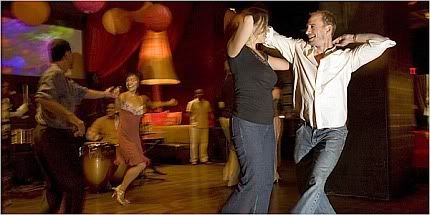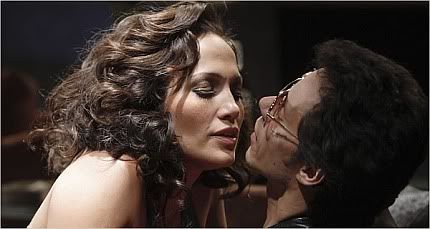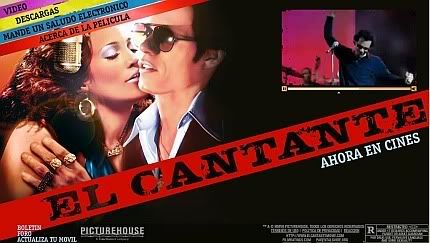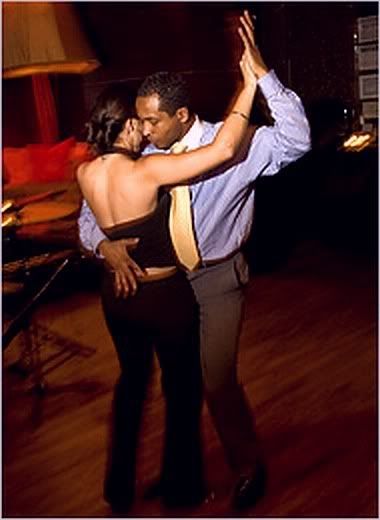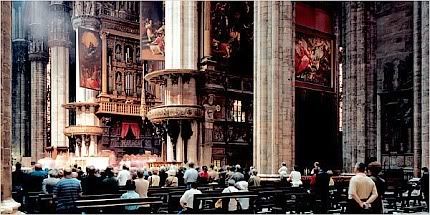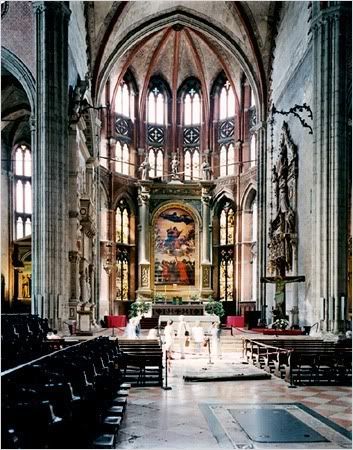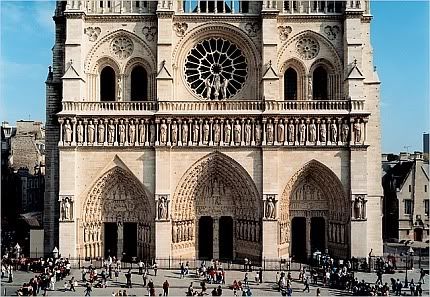III. The Inner Light
It is a familiar story, and seems to conclude with a happy ending. But in truth the Great Separation was never a fait accompli, even in Western Europe, where it was first conceived. Old-style Christian political theology had an afterlife in the West, and only after the Second World War did it cease to be a political force. In the 19th and early 20th centuries a different challenge to the Great Separation arose from another quarter. It came from a wholly new kind of political theology heavily indebted to philosophy and styling itself both modern and liberal. I am speaking of the "liberal theology" movement that arose in Germany not long after the French Revolution, first among Protestant theologians, then among Jewish reformers. These thinkers, who abhorred theocracy, also rebelled against Hobbes's vision, favoring instead a political future in which religion — properly chastened and intellectually reformed — would play an absolutely central role.
And the questions they posed were good ones. While granting that ignorance and fear had bred pointless wars among Christian sects and nations, they asked: Were those the only reasons that, for a millennium and a half, an entire civilization had looked to Jesus Christ as its savior? Or that suffering Jews of the Diaspora remained loyal to the Torah? Could ignorance and fear explain the beauty of Christian liturgical music or the sublimity of the Gothic cathedrals? Could they explain why all other civilizations, past and present, founded their political institutions in accordance with the divine nexus of God, man and world? Surely there was more to religious man than was dreamed of in Hobbes's philosophy.
That certainly was the view of Jean-Jacques Rousseau, who did more than anyone to develop an alternative to Hobbes. Rousseau wrote no treatise on religion, which was probably a wise thing, since when he inserted a few pages on religious themes into his masterpiece, "Ãmile" (1762), it caused the book to be burned and Rousseau to spend the rest of his life on the run. This short section of "Ãmile," which he called "The Profession of Faith of the Savoyard Vicar," has so deeply shaped contemporary views of religion that it takes some effort to understand why Rousseau was persecuted for writing it. It is the most beautiful and convincing defense of man's religious instincts ever to flow from a modern pen — and that, apparently, was the problem. Rousseau spoke of religion in terms of human needs, not divine truths, and had his Savoyard vicar declare, "I believe all particular religions are good when one serves God usefully in them." For that, he was hounded by pious Christians.
Rousseau had a Hobbes problem, too: he shared the Englishman's criticisms of theocracy, fanaticism and the clergy, but he was a friend of religion. While Hobbes beat the drums of ignorance and fear, Rousseau sang the praises of conscience, of charity, of fellow feeling, of virtue, of pious wonder in the face of God's creation. Human beings, he thought, have a natural goodness they express in their religion. That is the theme of the "Profession of Faith," which tells the parable of a young vicar who loses his faith and then his moral compass once confronted with the hypocrisy of his co-religionists. He is able to restore his equilibrium only when he finds a new kind of faith in God by looking within, to his own "inner light" (lumière intérieure). The point of Rousseau's story is less to display the crimes of organized churches than to show that man yearns for religion because he is fundamentally a moral creature. There is much we cannot know about God, and for centuries the pretense of having understood him caused much damage to Christendom. But, for Rousseau, we need to believe something about him if we are to orient ourselves in the world.
Among modern thinkers, Rousseau was the first to declare that there is no shame in saying that faith in God is humanly necessary. Religion has its roots in needs that are rational and moral, even noble; once we see that, we can start satisfying them rationally, morally and nobly. In the abstract, this thought did not contradict the principles of the Great Separation, which gave reasons for protecting the private exercise of religion. But it did raise doubts about whether the new political thinking could really do without reference to the nexus of God, man and world. If Rousseau was right about our moral needs, a rigid separation between political and theological principles might not be psychologically sustainable. When a question is important, we want an answer to it: as the Savoyard vicar remarks, "The mind decides in one way or another, despite itself, and prefers being mistaken to believing in nothing." Rousseau had grave doubts about whether human beings could be happy or good if they did not understand how their actions related to something higher. Religion is simply too entwined with our moral experience ever to be disentangled from it, and morality is inseparable from politics.
IV. Rousseau's Children
By the early 19th century, two schools of thought about religion and politics had grown up in the West. Let us call them the children of Hobbes and the children of Rousseau. For the children of Hobbes, a decent political life could not be realized by Christian political theology, which bred violence and stifled human development. The only way to control the passions flowing from religion to politics, and back again, was to detach political life from them completely. This had to happen within Western institutions, but first it had to happen within Western minds. A reorientation would have to take place, turning human attention away from the eternal and transcendent, toward the here and now. The old habit of looking to God for political guidance would have to be broken, and new habits developed. For Hobbes, the first step toward achieving that end was to get people thinking about — and suspicious about — the sources of faith.
Though there was great reluctance to adopt Hobbes's most radical views on religion, in the English-speaking world the intellectual principles of the Great Separation began to take hold in the 18th century. Debate would continue over where exactly to place the line between religious and political institutions, but arguments about the legitimacy of theocracy petered out in all but the most forsaken corners of the public square. There was no longer serious controversy about the relation between the political order and the divine nexus; it ceased to be a question. No one in modern Britain or the United States argued for a bicameral legislature on the basis of divine revelation.
The children of Rousseau followed a different line of argument. Medieval political theology was not salvageable, but neither could human beings ignore questions of eternity and transcendence when thinking about the good life. When we speculate about God, man and world in the correct way, we express our noblest moral sentiments; without such reflection we despair and eventually harm ourselves and others. That is the lesson of the Savoyard vicar.
In the aftermath of the French Revolution, the Terror and Napoleon's conquests, Rousseau's children found a receptive audience in continental Europe. The recent wars had had nothing to do with political theology or religious fanaticism of the old variety; if anything, people reasoned, it was the radical atheism of the French Enlightenment that turned men into beasts and bred a new species of political fanatic. Germans were especially drawn to this view, and a wave of romanticism brought with it great nostalgia for the religious "world we have lost." It even touched sober philosophers like Immanuel Kant and G. W. F. Hegel. Kant adored "Ãmile" and went somewhat further than Rousseau had, not only accepting the moral need for rational faith but arguing that Christianity, properly reformed, would represent the "true universal Church" and embody the very "idea" of religion. Hegel went further still, attributing to religion an almost vitalistic power to forge the social bond and encourage sacrifice for the public good. Religion, and religion alone, is the original source of a people's shared spirit, which Hegel called its Volksgeist.
These ideas had an enormous impact on German religious thought in the 19th century, and through it on Protestantism and Judaism throughout the West. This was the century of "liberal theology," a term that requires explanation. In modern Britain and the United States, it was assumed that the intellectual, and then institutional, separation of Christianity and modern politics had been mutually beneficial — that the modern state had benefited by being absolved from pronouncing on doctrinal matters, and that Christianity had benefited by being freed from state interference. No such consensus existed in Germany, where the assumption was that religion needed to be publicly encouraged, not reined in, if it was to contribute to society. It would have to be rationally reformed, of course: the Bible would have to be interpreted in light of recent historical findings, belief in miracles abandoned, the clergy educated along modern lines and doctrine adapted to a softer age. But once these reforms were in place, enlightened politics and enlightened religion would join hands.
Protestant liberal theologians soon began to dream of a third way between Christian orthodoxy and the Great Separation. They had unshaken faith in the moral core of Christianity, however distorted it may have been by the forces of history, and unshaken faith in the cultural and political progress that Christianity had brought to the world. Christianity had given birth to the values of individuality, moral universalism, reason and progress on which German life was now based. There could be no contradiction between religion and state, or even tension. The modern state had only to give Protestantism its due in public life, and Protestant theology would reciprocate by recognizing its political responsibilities. If both parties met their obligations, then, as the philosopher F. W. J. Schelling put it, "the destiny of Christianity will be decided in Germany."
Among Jewish liberal thinkers, there was a different sort of hope, that of acceptance as equal citizens. After the French Revolution, a fitful process of Jewish emancipation began in Europe, and German Jews were more quickly integrated into modern cultural life than in any other European country — a fateful development. For it was precisely at this moment that German Protestants were becoming convinced that reformed Christianity represented their national Volksgeist. While the liberal Jewish thinkers were attracted to modern enlightened faith, they were also driven by the apologetic need to justify Judaism's contribution to German society. They could not appeal to the principles of the Great Separation and simply demand to be left alone. They had to argue that Judaism and Protestantism were two forms of the same rational moral faith, and that they could share a political theology. As the Jewish philosopher and liberal reformer Hermann Cohen once put it, "In all intellectual questions of religion we think and feel ourselves in a Protestant spirit."
V. Courting the Apocalypse
This was the house that liberal theology built, and throughout the 19th century it looked secure. It wasn't, and for reasons worth pondering. Liberal theology had begun in hope that the moral truths of biblical faith might be intellectually reconciled with, and not just accommodated to, the realities of modern political life. Yet the liberal deity turned out to be a stillborn God, unable to inspire genuine conviction among a younger generation seeking ultimate truth. For what did the new Protestantism offer the soul of one seeking union with his creator? It prescribed a catechism of moral commonplaces and historical optimism about bourgeois life, spiced with deep pessimism about the possibility of altering that life. It preached good citizenship and national pride, economic good sense and the proper length of a gentleman's beard. But it was too ashamed to proclaim the message found on every page of the Gospels: that you must change your life. And what did the new Judaism bring to a young Jew seeking a connection with the traditional faith of his people? It taught him to appreciate the ethical message at the core of all biblical faith and passed over in genteel silence the fearsome God of the prophets, his covenant with the Jewish people and the demanding laws he gave them. Above all, it taught a young Jew that his first obligation was to seek common ground with Christianity and find acceptance in the one nation, Germany, whose highest cultural ideals matched those of Judaism, properly understood. To the decisive questions — "Why be a Christian?" and "Why be a Jew?" — liberal theology offered no answer at all.
By the turn of the 20th century, the liberal house was tottering, and after the First World War it collapsed. It was not just the barbarity of trench warfare, the senseless slaughter, the sight of burned-out towns and maimed soldiers that made a theology extolling "modern civilization" contemptible. It was that so many liberal theologians had hastened the insane rush to war, confident that God's hand was guiding history. In August 1914, Adolf von Harnack, the most respected liberal Protestant scholar of the age, helped Kaiser Wilhelm II draft an address to the nation laying out German military aims. Others signed an infamous pro-war petition defending the sacredness of German militarism. Astonishingly, even Hermann Cohen joined the chorus, writing an open letter to American Jews asking for support, on the grounds that "next to his fatherland, every Western Jew must recognize, revere and love Germany as the motherland of his modern religiosity." Young Protestant and Jewish thinkers were outraged when they saw what their revered teachers had done, and they began to look elsewhere.
But they did not turn to Hobbes, or to Rousseau. They craved a more robust faith, based on a new revelation that would shake the foundations of the whole modern order. It was a thirst for redemption. Ever since the liberal theologians had revived the idea of biblical politics, the stage had been set for just this sort of development. When faith in redemption through bourgeois propriety and cultural accommodation withered after the Great War, the most daring thinkers of the day transformed it into hope for a messianic apocalypse — one that would again place the Jewish people, or the individual Christian believer, or the German nation, or the world proletariat in direct relation with the divine.
Young Weimar Jews were particularly drawn to these messianic currents through the writings of Martin Buber, who later became a proponent of interfaith understanding but as a young Zionist promoted a crude chauvinistic nationalism. In an early essay he called for a "Masada of the spirit" and proclaimed: "If I had to choose for my people between a comfortable, unproductive happiness . . . and a beautiful death in a final effort at life, I would have to choose the latter. For this final effort would create something divine, if only for a moment, but the other something all too human." Language like this, with strong and discomforting contemporary echoes for us, drew deeply from the well of biblical messianism. Yet Buber was an amateur compared with the Marxist philosopher Ernst Bloch, who used the Bible to extol the utopia then under construction in the Soviet Union. Though an atheist Jew, Bloch saw a connection between messianic hope and revolutionary violence, which he admired from a distance. He celebrated Thomas Müntzer, the 16th-century Protestant pastor who led bloody peasant uprisings and was eventually beheaded; he also praised the brutal Soviet leaders, famously declaring "ubi Lenin, ibi Jerusalem" — wherever Lenin is, there is Jerusalem.
But it was among young Weimar Protestants that the new messianic spirit proved most consequential. They were led by the greatest theologian of the day, Karl Barth, who wanted to restore the drama of religious decision to Christianity and rejected any accommodation of the Gospel to modern sensibilities. When Hitler came to power, Barth acquitted himself well, leading resistance against the Nazi takeover of the Protestant churches before he was forced into exile in 1935. But others, who employed the same messianic rhetoric Barth did, chose the Nazis instead. A notorious example was Emanuel Hirsch, a respected Lutheran theologian and translator of Kierkegaard, who welcomed the Nazi seizure of power for bringing Germany into "the circle of the white ruling peoples, to which God has entrusted the responsibility for the history of humanity." Another was Friedrich Gogarten, one of Barth's closest collaborators, who sided with the Nazis in the summer of 1933 (a decision he later regretted). In the 1920s, Gogarten rejoiced at the collapse of bourgeois Europe, declaring that "we are glad for the decline, since no one enjoys living among corpses," and called for a new religion that "attacks culture as culture . . . that attacks the whole world." When the brownshirts began marching and torching books, he got his wish. After Hitler completed his takeover, Gogarten wrote that "precisely because we are today once again under the total claim of the state, it is again possible, humanly speaking, to proclaim the Christ of the Bible and his reign over us."
All of which served to confirm Hobbes's iron law: Messianic theology eventually breeds messianic politics. The idea of redemption is among the most powerful forces shaping human existence in all those societies touched by the biblical tradition. It has inspired people to endure suffering, overcome suffering and inflict suffering on others. It has offered hope and inspiration in times of darkness; it has also added to the darkness by arousing unrealistic expectations and justifying those who spill blood to satisfy them. All the biblical religions cultivate the idea of redemption, and all fear its power to inflame minds and deafen them to the voice of reason. In the writings of these Weimar figures, we encounter what those orthodox traditions always dreaded: the translation of religious notions of apocalypse and redemption into a justification of political messianism, now under frightening modern conditions. It was as if nothing had changed since the 17th century, when Thomas Hobbes first sat down to write his "Leviathan."

 Paulo Fridman for The New York Times
Paulo Fridman for The New York Times Adriana Zehbrauskas for The New York Times
Adriana Zehbrauskas for The New York Times
